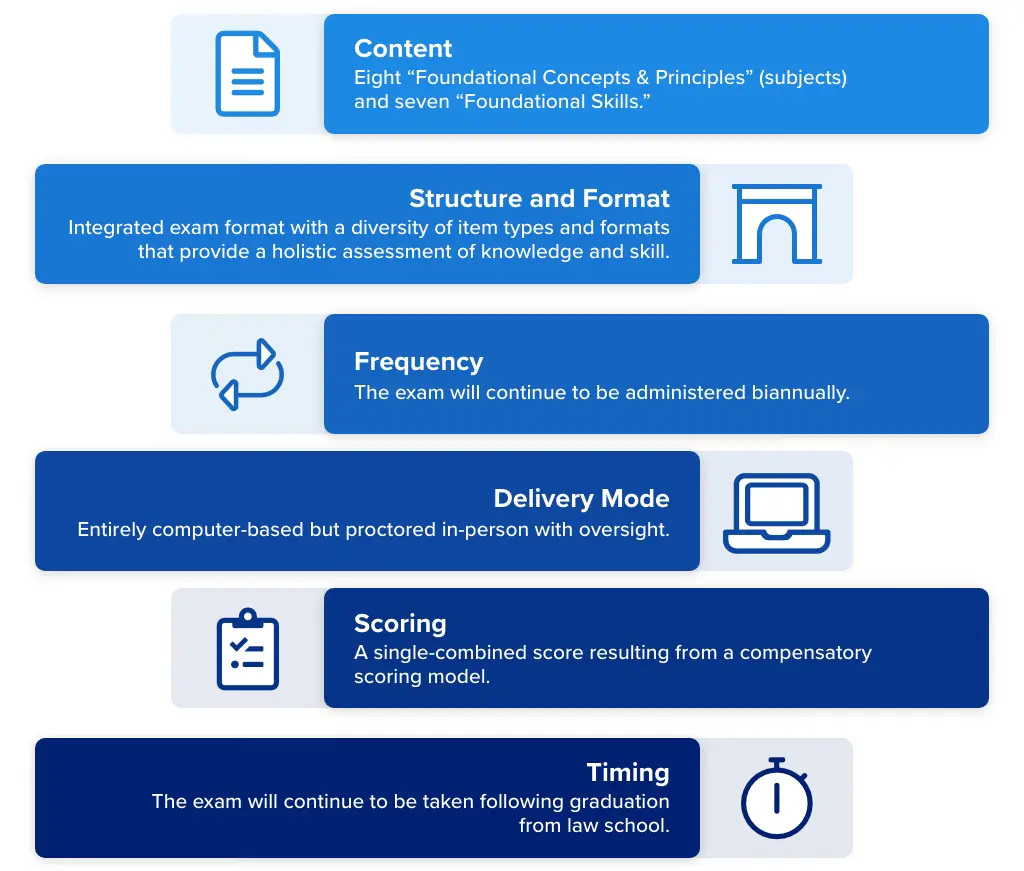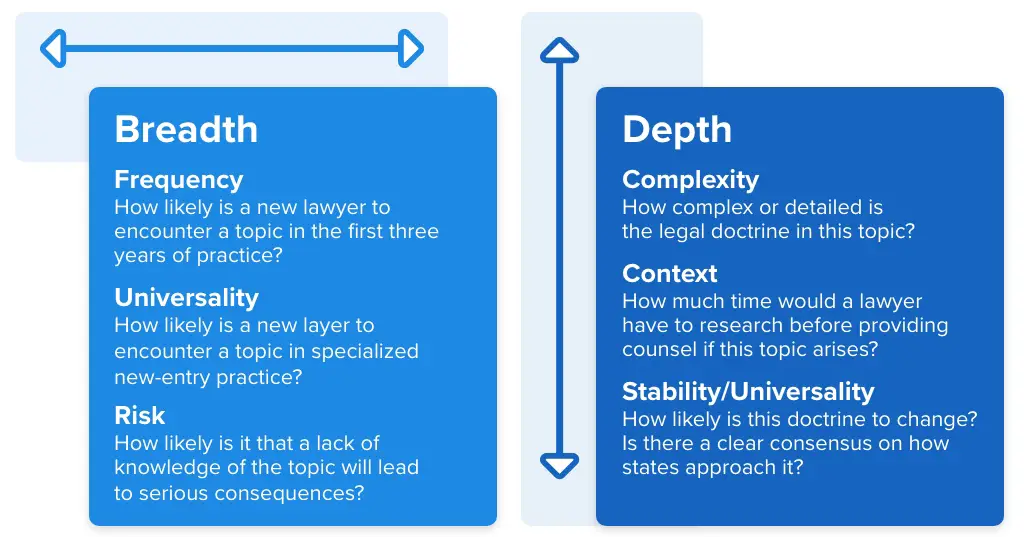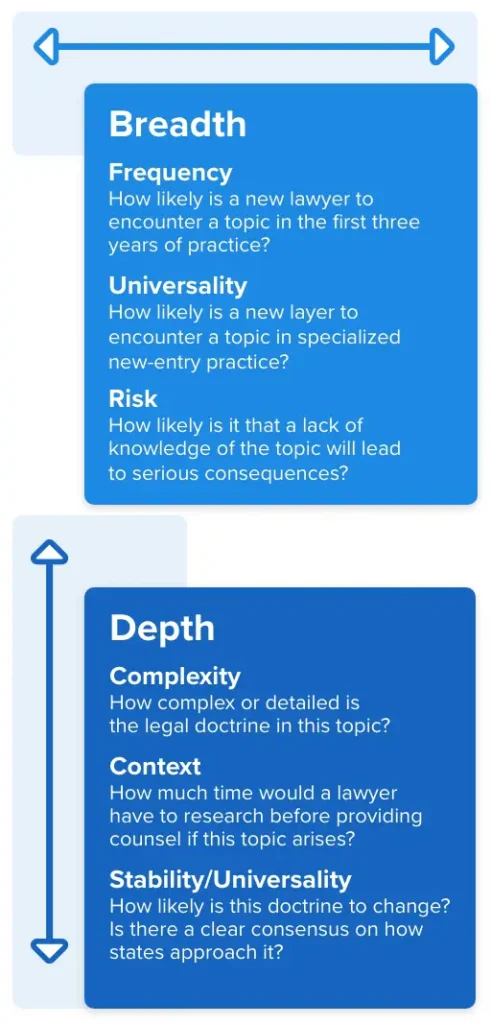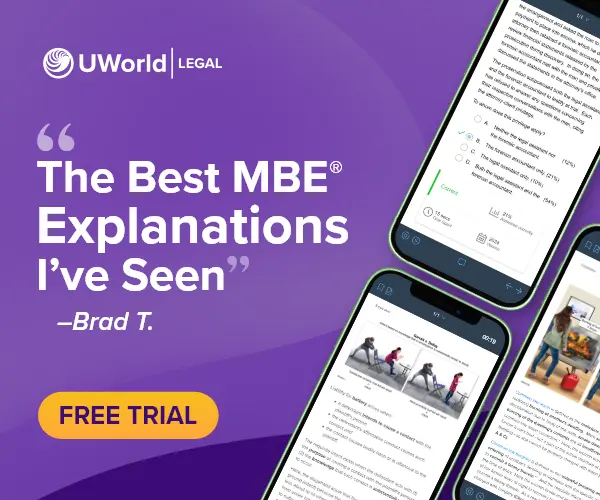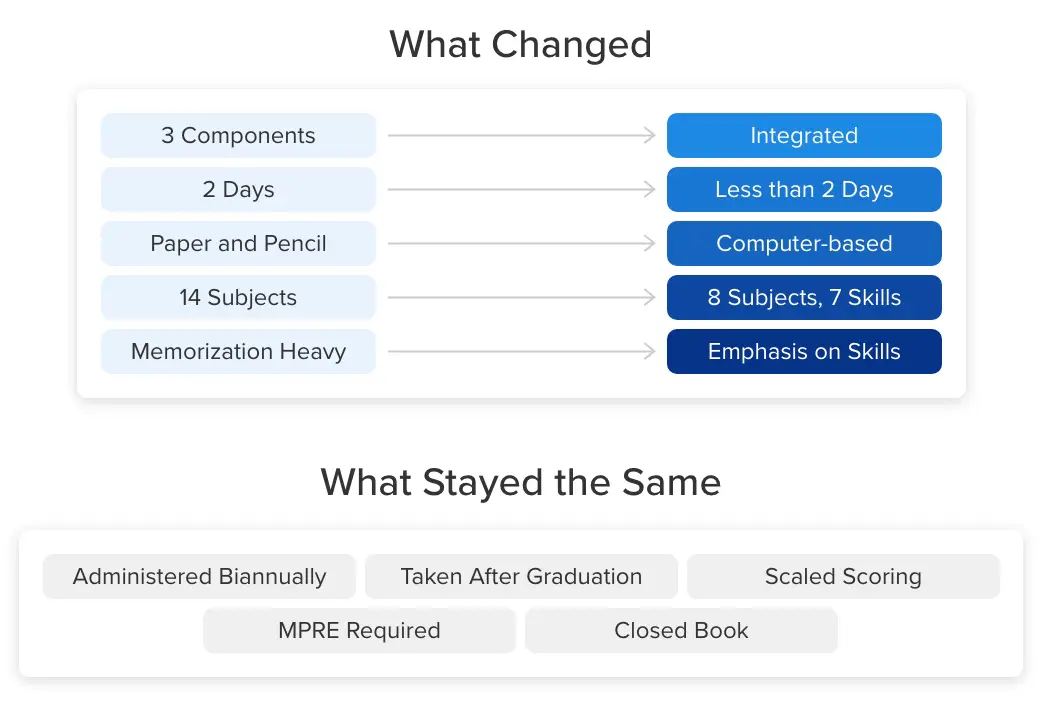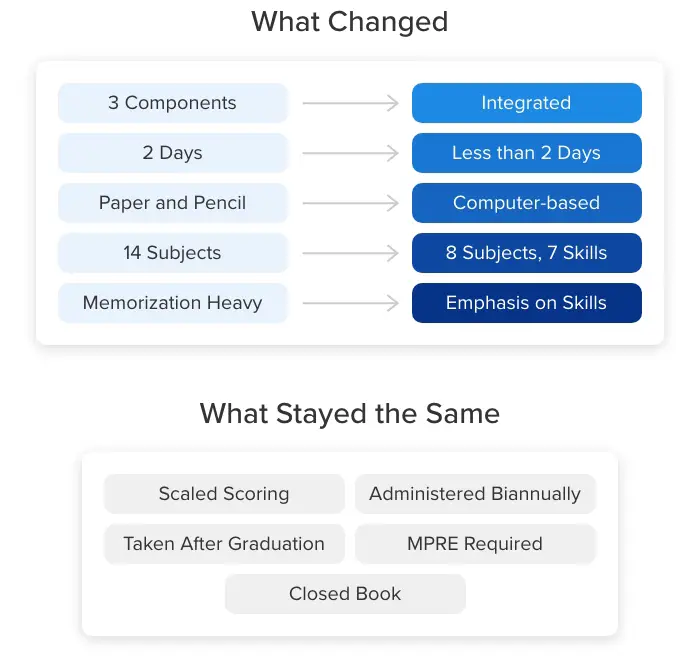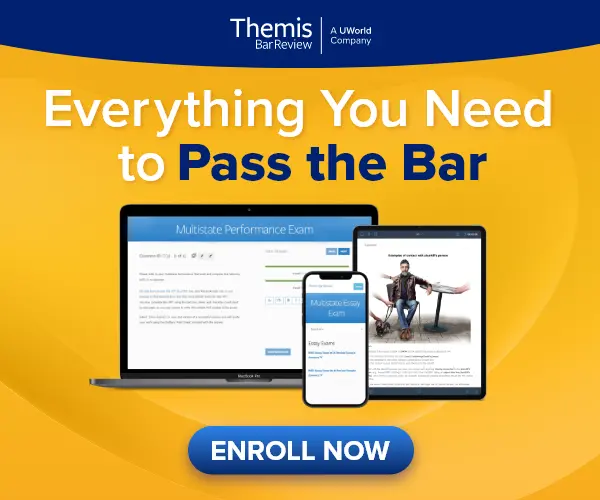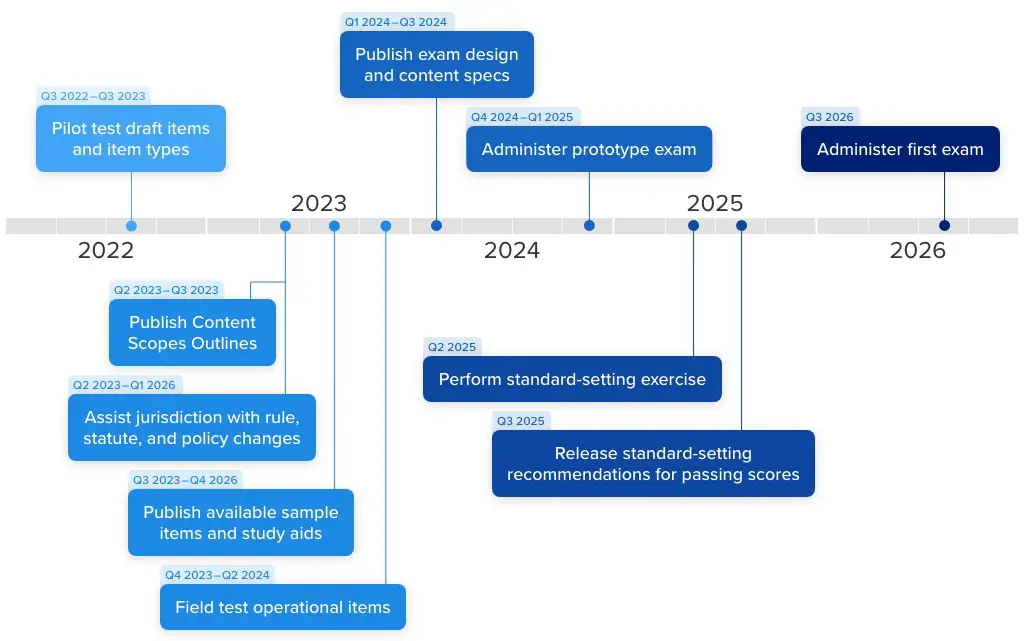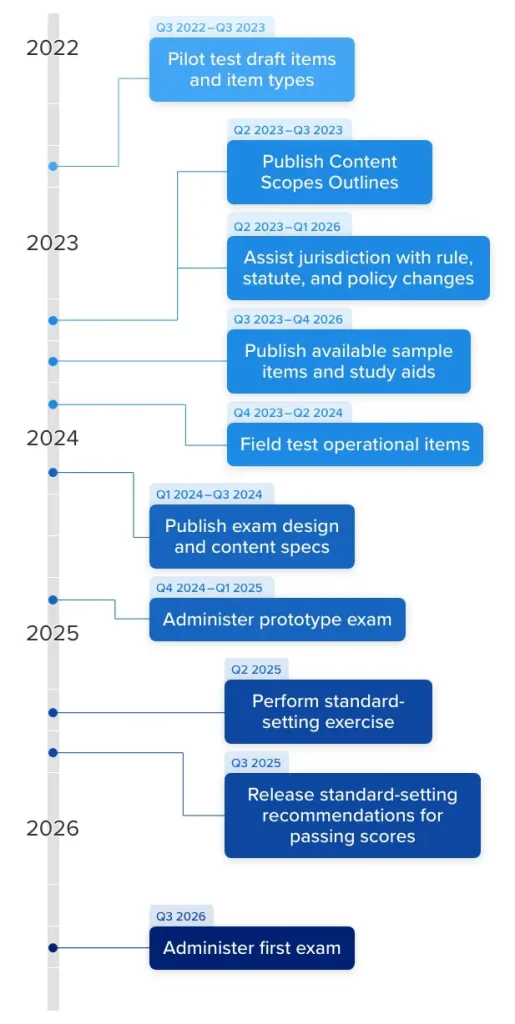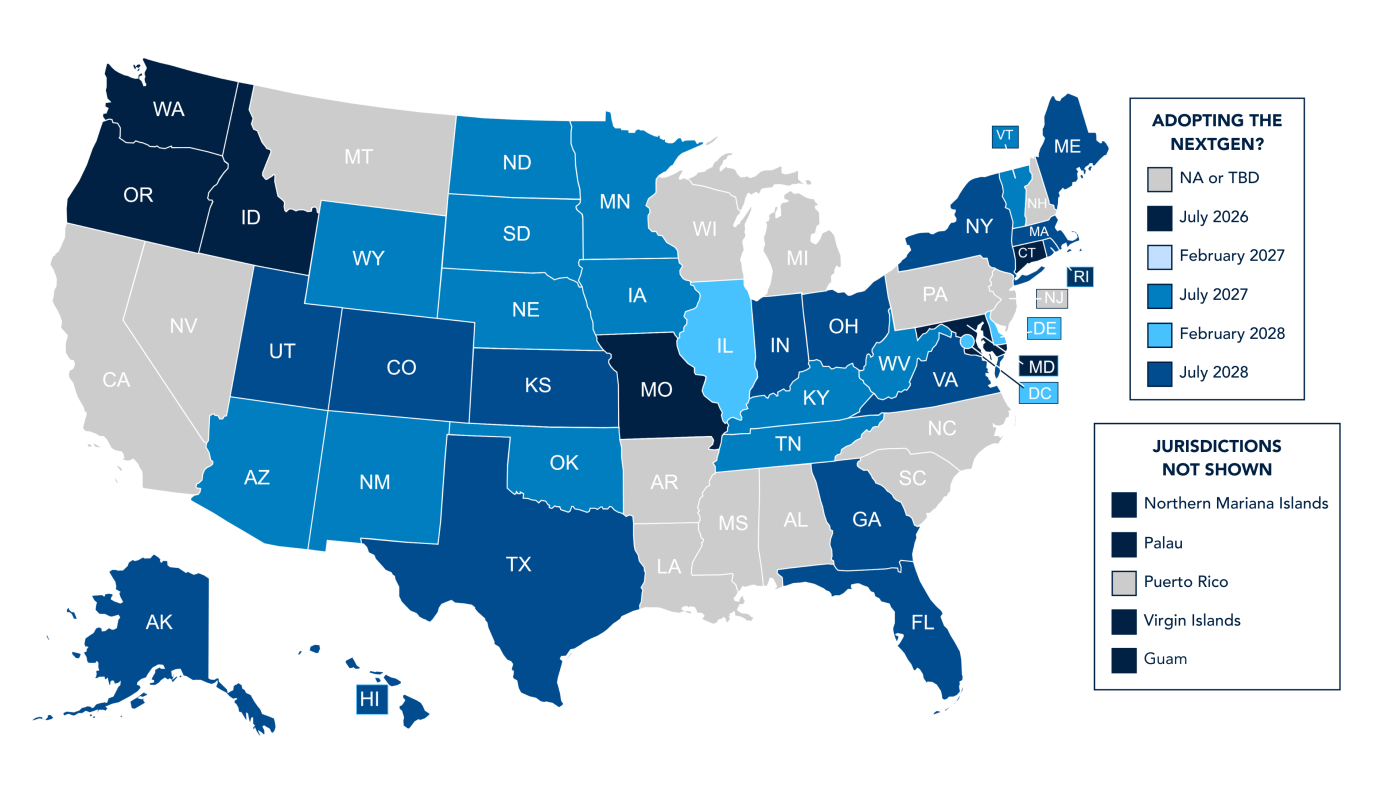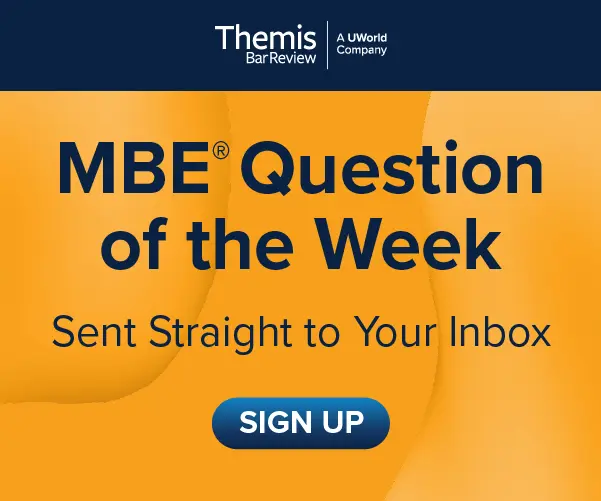The NCBE has been cautious about what bar exam changes it publishes to avoid committing to features that may change. While the NCBE hasn’t published an official blueprint, it has released a draft of its Content Scope Outlines.
Here are the most current details regarding the NCBE NextGen bar exam's subjects, skill areas, structure, format, and scoring.
What is the NextGen Bar Exam?
The NextGen bar exam is the culmination of a years-long review of the Uniform Bar Examination (UBE®). This overhaul began partly in response to increasing discontent that the current UBE is more a test of candidates’ ability to memorize doctrinal law than a measurement of their competency to practice it.
With this in mind, the NCBE tasked a Content Scope Committee with conducting a three-year study to ensure that the bar exam "continues to test the knowledge, skills, and abilities required for competent entry-level legal practice." The result: the Content Scope Outlines for the NextGen bar exam.
NextGen Bar Exam Content, Format, Scoring, and Delivery
NCBE President and CEO Judith A. Gundersen has said that the most significant bar exam changes are the adjustments to the subject matter, increased skills testing, integration, and computer-based testing.
The most important changes for you involve content modifications. The committee considered the "breadth" and "depth" of the Foundational Concepts and Principles and Foundational Skills featured on the new exam.
As new data is gathered, further details about the NextGen bar exam content will be revealed. Pilot testing, which began in 2022, has provided the NCBE with valuable insights into how to most effectively distribute legal resources, such as the Federal Rules of Evidence. It has also helped in determining the optimal approach for assessing more subjective issues and making informed decisions on the timing for various item types and the exam overall.
Foundational Concepts & Principles (Subjects)
The 8 NextGen bar exam subjects have been labeled as Foundational Concepts & Principles. These subjects are not new but are an abbreviated version of the 14 subjects that currently appear on the UBE.
The pruning of subject matter comes on the heels of complaints that much of the legal knowledge tested on the UBE is unnecessary to have memorized in practice. The remaining subjects have been deemed more universally relevant. They are:
- Business Associations (including Agency)
- Civil Procedure (including constitutional protections and proceedings before administrative agencies)
- Constitutional Law* (excluding principles covered under Civil Procedure and Criminal Law)
- Contract Law (including Art. 2 of the UCC)
- Criminal Law and Constitutional Protections Impacting Criminal Proceedings (excluding coverage of criminal procedure beyond constitutional protections)
- Evidence
- Real Property
- Torts
*While Constitutional Law issues may not be a common practice area for first-year attorneys, the committee views lawyers as “custodians of the Constitution,” a consideration they have integrated the scope of tested topics.
Foundational Skills Testing
Foundational Skills will likely be measured in the context of Foundational Concepts and Principles. Any skill tested outside of this context will provide appropriate legal resources, much like the MPT component of the UBE. The Foundational Skills include:
| Foundational Skills | |
|---|---|
| A |
Foundational Skills Group 1
|
| B |
Foundational Skills Group 2
|
| C | Legal Research |
| D | Legal Writing |
*Professional Responsibility will not be assessed in stand-alone questions but may be assessed with other Foundational Skills from Group 2.
Some Foundational Skills include performance skills such as "client interviewing" and "negotiation." To ensure that competency is measured objectively, you will be provided uniform content and assessed based on your written or selected responses.
Foundational Skills testing will offer you a number of ways to demonstrate your ability. For example, an "Issue Spotting and Analysis" item may ask you to assess the probability of an outcome of a claim based on relevant legal rules and standards. Alternatively, you may be provided a collection of legal resources from a client file and asked to identify critical issues that require resolution to demonstrate skill in "Legal Research."
| Foundational Skills Considerations | |
|---|---|
| Practice Analysis Continuity | What simulated tasks are best oriented towards those that are important to new lawyers? |
| Universality/Balance | What simulated tasks have the most overlap with the greatest number of real-world lawyering tasks, and which provide the best balance between different types of practice? |
| Cost/Practicality | Which Foundational Skills can be realistically tested in a written exam while remaining affordable? |
Format
The committee recommended that item sets include stand-alone questions alongside a variety of formats, such as but not limited to:
- Selected-response
- Short-answer
- Extended constructed-response items
The item set format allows for a collection of questions to be based around a single scenario and developed as a unit. This format is a departure from the standalone questions present in the UBE components and the siloing of question types (multiple-choice, essay, performance) into those components: the Multistate Bar Examination (MBE®), the Multistate Essay Examination (MEE®), and the Multistate Performance Test (MPT®).
An integrated format allows the NCBE to replicate situations more faithfully that newly minted lawyers will encounter at the beginning of their careers. To ensure that the new format faithfully reflects competency, the NCBE has been pilot-testing item sets to collect performance data and adjust accordingly.
Timing
The committee has specifically recommended that “the bar exam be given as a single event at or near the point of licensure." That means you will take the NextGen bar exam following graduation and cannot take portions of the exam during your time in law school. However, jurisdictions will still have the last say as to whether you can apply for the new bar exam in their final semester.
The NextGen bar exam is expected to be no longer, and perhaps shorter, than the current 12-hour, 2-day exam, so long as validity and score reliability can be maintained.
Scoring
The NextGen bar exam will be scored using a compensatory scoring model that is designed to holistically assess your competency by allowing areas of strength to compensate for areas of weakness.
Scaled scoring will still be used to convert raw scores based on an exam version's relative difficulty. For example, exam version "A" administered in the winter may be deemed more difficult than exam version "B" administered in summer. Therefore, exam B’s results will be adjusted to resolve the discrepancy and ensure fairness.
Administration
The NextGen bar exam will be administered biannually. The exam will be entirely computer-based and proctored at jurisdiction-managed facilities or approved testing centers.
NextGen Bar Exam vs. UBE
While the NextGen bar exam will be markedly different from its predecessor, there are some notable similarities.
*Information regarding the NextGen bar exam is subject to change.
The greatest differences between the 2 bar exams lie in content and item format. The UBE’s current iteration consists of 14 subjects between the MEE and MBE. In contrast, the NextGen bar exam will test 8 Foundational Concepts and Principles. The remaining subjects will not be as comprehensive.
The Multistate Professional Responsibility Examination (MPRE®) is still required on the NextGen bar exam. It’s important to recognize that you will be expected to have the law memorized for some of the topics within these subjects. For others, however, you will only need enough familiarity to be able to work with legal sources.
| Current UBE Subjects |
NextGen Subjects |
|---|---|
| Business Associations | |
| Civil Procedure | |
| Conflict of Laws | |
| Constitutional Law | |
| Contracts | |
| Criminal Law/Procedure | |
| Evidence | |
| Family Law | |
| Real Property | |
| Secured Transactions | |
| Torts | |
| Trusts and Estates |
Implementation Timeline
The first administration of the NextGen bar exam is scheduled for July 2026. Notable events leading up to that point include conducting more field testing of operational items (through Q4 of 2025), performing national standard-setting exercises starting in Q2 of 2025, and releasing recommendations for passing scores in Q3 of 2025.
| Glossary of Terms | |
|---|---|
| Term | Definition |
| Item Set | A group of questions revolving around a single scenario or stimulus. |
| Pilot Testing | Administration of proto-item formats under simulated conditions to small groups of law students and/or licensed practicing lawyers. |
| Field Testing | Large-scale administration of finalized new items under realistic conditions. |
| Prototype Exam | Large-scale administration of a full-length exam. |
How Themis + UWorld Can Help
As soon as the NCBE announced plans for the NextGen bar exam, Themis and UWorld assembled a team of bar exam and educational experts to begin adapting, developing, and pilot testing skills-based content.
Themis Bar Review debuted the first bar exam course designed to be delivered online. The bar prep company was also the first to introduce segmented lectures and spaced-repetition technology, and the first to design separate study tracks to accommodate learning differences.
Frequently Asked Questions
Will states have a choice to implement the NextGen or current bar exam?
Eventually, the NCBE will develop and administer only the NextGen bar exam, which will become the UBE. However, there will be a temporary transition period of 3-4 years where states will have a choice between administering the NextGen bar exam and the existing bar exam.
Does the NCBE provide additional guidance for the new bar exam?
The NCBE released its final Test Content Specifications in late 2024.
Is the new bar exam easy?
The new bar exam will not be easy, but its relative difficulty cannot be determined until it is rolled out in 2026. However, it will emphasize skill and critical thought over rote memorization, which may be more or less difficult for examinees.
When will the new bar exam start?
The NCBE will begin administering the NextGen bar exam in July 2026.

